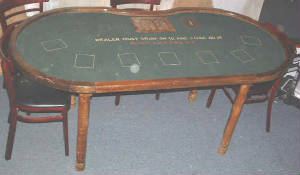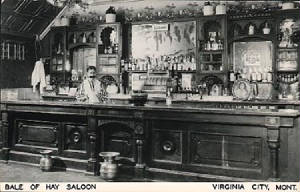|
 The game with many names. First called Vingt-Un (Van-Un) which is French for two-one and then Vingt-Et-Un (21). Today it is known as 21 and Blackjack. The game with many names. First called Vingt-Un (Van-Un) which is French for two-one and then Vingt-Et-Un (21). Today it is known as 21 and Blackjack.
Hoyle lists the game as Vingt-Un in its 1875 publication. By 1924 Hoyle listed it as Vingt-Et-Un (Van-ta-un), French for Twenty-One.
The French game Vingt-Un finally crossed the ocean from Europe to America in the late 1800's and was introduced into the U.S. through the predominately French Community of New Orleans.
So how did "Twenty-One" become "Blackjack"? Apparently when the game was first introduced in American it wasn't very popular so the gambling houses tried various bonus payouts to get the players to the tables. One such bonus was a 10-to-1 payout if the player's hand consisted of the Ace of Spades and a black Jack (either the Jack of Clubs of the Jack of Spades). This hand was called a "blackjack" for obvious reasons and the name stuck even though the bonus payout was soon abolished.
 This banking game was played quit differently back in the Old West as you will see.
The Dealer begins by dealing a card to each player plus himself, face down. After receiving a card the punter (player) places his stake (bet) upon his card. The second card is dealt but before this occurs the Dealer looks at his card and if he thinks proper may elect to "double" all stakes by crying, "Double".
Once all stakes are correct the second card is dealt. If the Dealer has a natural (21) he declares it at once and collects all the stakes which must be "doubled" because of the "natural".
If no "natural" is held by the Dealer, each punter beginning to the Dealers left is given the chance to improve his hand. If a card is taken it is placed face-up. If the total of all cards exceeds 21 that punter has overdrawn and loses.
After each punter has had his turn the Dealer turns up his cards and if he has 17 to 20 he must stand. Punters with less than Dealer or ties Dealer,loses.
If the Dealer draws a total of 21 he wins double the stakes from each punter except "ties" and those punters that had already busted.
If the Dealer busts he pays all who stayed and double to 21's.
Any Punter could split his hand if holding a pair.


|